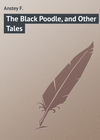Loe raamatut: «The Giant's Robe», lehekülg 5
At this the gander lurched against a half-buried flower pot, and rolled helplessly over with its eyes closed. 'Oh, the poor thing,' cried Mabel, 'it's dying!'
'Do you see that?' demanded its owner, furiously; 'it's dying, and you've had it poisoned, sir; that soaked bread was put there by you or your orders – and, by the Lord, you shall pay for it!'
'I never ordered or put it there either,' said his enemy doggedly.
'We shall see about that – we shall see,' said Mr. Humpage; 'you can say that by-and-by.'
'It's no good losing your temper, now – keep cool, can't you?' roared Uncle Solomon.
'It's likely to make a man cool, isn't it? to come for a quiet stroll on Sunday afternoon, and find that his gander has been decoyed into a neighbour's garden and induced to poison itself with whisky?'
'Decoyed? I like that! pretty innercent, that bird of yours! too timid to come in without a reg'lar invitation, wasn't he?' jeered Mr. Lightowler; 'quite 'ad to press him to step in and do the garden up a bit. You and your gander!'
Mabel had already escaped; Mark remained trying to persuade his uncle to come away before the matter ceased to be farcical.
'I shall take this matter up, sir! I shall take it up!' said Mr. Humpage, in a white rage; 'and I don't think it will do you credit as a churchwarden, let me tell you!'
'Don't you go bringing that in here, now!' retorted Uncle Solomon. 'I'll not be spoken to as a churchwarden by you, Mr. 'Umpage, sir, of all parties!'
'You'll not be spoken to by anybody very soon – at any rate, as a churchwarden. I mean to bring this affair before the magistrates. I shall take out a summons against you for unlawfully ill-treating and abusing my gander, sir!'
'I tell you I never ill-treated him; as for abuse, I don't say. But that's neither here nor there. He ain't so thin-skinned as all that, your gander ain't. And if I choose to put whisky, or brandy, or champagne-cup about my grounds, I'm not obliged to consult your ridik'lous gander, I do hope. I didn't ask him to sample 'em. I don't care a brass button for your summonses. You can summon me till you're black in the face!'
But in spite of these brave words Mr. Lightowler was really not a little alarmed by the threat.
'We shall see about that,' said the other again, viciously. 'And now, once more, will you give me back my poor bird?'
Mark thought it had gone far enough. He took up the heavy bird, which made some maudlin objections, and carried it gingerly to the fence. 'Here's the victim, Mr. Humpage,' he said lightly. 'I think it will be itself again in a couple of hours or so. And now, perhaps, we can let the matter drop for the present.'
The old gentleman glared at Mark as he received his bird: 'I don't know who you may be, young sir, or what share you've had in this disgraceful business. If I trace it to you, you shall repent of it, I promise you! I don't wish to have any further communication with you or your friend, who's old enough to know his duty better as a neighbour and a Christian. You will let him know, with my compliments, that he'll hear more of this.'
He retired with the outraged bird under his arm, leaving Uncle Solomon, who had of course heard his parting words, looking rather ruefully at his nephew.
'It's all very well for you to laugh,' he said to Mark, as they turned to go into the house again; 'but let me tell you if that hot-tempered old idiot goes and brings all this up at Petty Sessions, it may be an awkward affair for me. He's been a lawyer, has 'Umpage, and he'll do his worst. A pretty thing to 'ave my name in all the papers about 'ere as torturing a goose! I dessay they'll try and make out that I poured the whisky down the brute's throat. It's Wilcox's doings, and none of mine; but they'll put it all on me. I'll drive over to Green & Ferret's to-morrow, and see how I stand. You've studied the law. What do you think about it, come? Can he touch me, eh? But he hasn't got a leg to stand on, like his gander – it's all nonsense, ain't it?'
If there had ever been a chance, Mark thought bitterly, after comforting his uncle as well as his very moderate acquaintance with the law permitted, of anything like intimacy between himself and the girl whose face had fascinated him so strangely, it was gone now: that bird of evil omen had baulked his hopes as effectually as its ancestors frustrated the aspiring Gaul.
The dusk was drawing on as they walked across the lawn, from which the russet glow of the sunset had almost faded; the commonplace villa before them was tinted with violet, and in the west the hedges and trees formed an intricate silhouette against a background of ruddy gold and pale lemon; one or two flamingo-coloured clouds still floated languidly higher up in a greenish blue sky; over everything the peace and calm had settled that mark the close of a perfect autumn day, with the additional stillness which always makes itself perceptible on a Sunday.
Mark felt the influence of it all, and was vaguely comforted – he remembered the passing interchange of glances across the fence, and it consoled him.
At supper that evening his uncle, too, recovered his spirits: 'If he brings a summons, they'll dismiss it,' he said confidently; 'but he knows better than that as a lawyer – if he does, he'll find the laugh turned against him, hey? I'm not answerable for what Wilcox chooses to do without my orders. I never told him he wasn't to – but that ain't like telling him to go and do it, is it now? And where's the cruelty, either? – a blend like that, too. Just try a glass, now, and say what you think – he'll be dropping in for more of it if he's the bird I take him for!'
But as they were going upstairs to bed, he stopped at the head of the staircase and said to Mark, 'Before I forget it, you remind me to get Wilcox to find out, quietly, the first thing to-morrow, how that gander is.'
CHAPTER VI.
SO NEAR AND YET SO FAR
WHEN Mark awoke next morning the weather had undergone one of those sudden and complete changes which form one of the chief attractions of our climate; there had been a frost, and with it a thin white mist, which threw its clinging veil over the landscape; the few trees which were near enough to be seen were covered with a kind of thick grey vegetation, that gave them a spectral resemblance to their summer selves. Breakfast was early, as Mark had to be down at St. Peter's as soon after morning chapel as possible, and he came down shivering to find his uncle already seated. 'The dog-cart will be round in five minutes,' said the latter gentleman, with his mouth full; 'so make the most of your time. You'll have a cold drive. I'll take you over to the station myself, and go on and see Ferret after.'
The too-zealous Wilcox brought the trap round. ''Ave you been round to see about that bird next door?' Mr. Lightowler asked rather anxiously, as the man stood by the mare's head. 'Yessir,' said Wilcox, with a grin; 'I went and saw Mr. 'Umpage's man, and he say the old gander was werry bad when they got 'im 'ome, but he ain't any the worse for what he 'ad this mornin', sir; though the man, he dew say as the gander seem a bit sorry for 'isself tew. They tough old birds 'a' got strong 'eads, sir; I knowed it 'ud do him no 'arm, bless ye!'
'Well, don't you go trying it again, Wilcox, that's all. Mind what I say,' said Uncle Solomon, with visible relief, 'else you and me'll 'ave words and part. Let her go,' and they drove off.
He gave Mark much good advice on the way, such as wealthy uncles seem to secrete and exude almost unconsciously, as toads yield moisture; but Mark paid only a moderate degree of attention to it as they spun past the low dim edges; he hardly noticed what could be seen along the road even, which was not much – a gable-end or a haystack starting out for an instant from the fog, or a shadowy labourer letting himself through a gate – he was thinking of the girl whose eyes had met his the afternoon before.
He had dreamed of her all that night – a confused ridiculous dream, but with a charm about it which was lingering still; he thought they had met and understood one another at once, and he had taken her to the village church where he had first seen her, and they had a private box, and Uncle Solomon took the chair, while old Mr. Shelford, Trixie, and young Langton were all in the choir, which was more like an orchestra. It was not particularly connected or reverent, but she had not been included in the general travesty – his sleeping brain had respected her image even in its waywardness, and presented it as vivid and charming as in life, so that the dream with all its absurdity seemed to have brought her nearer to him, and he could not resist the fancy that she might have some recollection of it too.
A low hum in the still air, and distant reports and choked railway whistles told them they were near the station, but the fog had grown so much denser that there was no other indication of it, until Mr. Lightowler brought up sharply opposite the end of an inclined covered staircase, which seemed to spring out of nothing and lead nowhere, where they left the dog-cart in charge of a flyman and went up to the platform.
There a few old gentlemen with rosy faces were stamping up and down and slapping their chests, exchanging their 'Raw morning this, sir's,' 'Ah, it is indeed's,' with an air of good men bearing up under an undeserved persecution.
'Sharp morning this to stand about in,' said Uncle Solomon; 'let's go into the waiting-room, there's a fire there.' The waiting-room was the usual drab little room, with a bottle of water and tumblers on a bare stained table, and local advertisements on the dingy walls; the gas was lighted, and flickered in a sickly white fishtail flame, but the fire was blazing cheerfully, giving a sheen to the silver-grey fur of a child in a crimson plush hat who stood before it embracing a small round basket out of which a Skye terrier's head was peering inquisitively.
The firelight shone, too, on the graceful form of a girl, who was bending towards it holding out her slender hands to the blaze. Mark scarcely needed to glance at the face she turned towards the newcomers to recognise that fortune had allowed him one more chance: Mr. Humpage's visitors were evidently returning to town by the same train as himself, and the old gentleman in person was standing with his back to them examining a time-table on the wall.
Uncle Solomon, in his relief at Wilcox's information that morning, did not perceive any awkwardness in the encounter, but moved about and coughed noisily, as if anxious to attract his enemy's attention. Mark felt considerably embarrassed, dreading a scene; but he glanced as often as he dared at the lady of his thoughts, who was drawing on her gloves again with a dainty deliberation.
'Godpapa,' said the little girl, suddenly, 'you never told me if Frisk had been good. Has he?'
'So good that he kept me awake thinking of him all night,' said the old gentleman drily, without turning.
'Did he howl, godpapa? He does sometimes when he's left out in the garden, you know.'
'He did,' said Mr. Humpage. 'Oh, yes – he howled; he's a clever dog at that.'
'And you really like him to?' said Dolly. 'Some people don't.'
'Narrow-minded of 'em, very,' growled the old gentleman.
'Isn't it?' said Dolly, innocently. 'Well, I'm glad you like it, godpapa, because now I shall bring him to see you again. When there's a moon he can howl much louder. I'll bring him when the next moon comes, shall I?'
'We'll see, Chuckie, we'll see. I shouldn't like to keep him sitting up all night to howl on my account; it wouldn't be good for his health. But the very next blue moon we have down in these parts, I'll send up for him – I promise you that.'
Dolly was evidently about to inquire searchingly into the nature of this local phenomenon, but before she could begin the old gentleman turned and saw that they were not alone.
'Mornin', Mr. 'Umpage,' said Uncle Solomon, clearing his throat; and Mark felt a pang of regret for the lost aspirate.
'Good morning to you, sir,' said the other, distantly.
The elder girl returned the bow which Mark risked, though without giving any sign of remembrance; but Dolly remarked audibly, 'Why, that's the old man next door that gave your goose something to make it giddy, isn't it, godpapa?'
'I hope,' said Uncle Solomon, 'that now you've had time to think over what 'appened yesterday afternoon, you'll see that you went too far in using the terms that fell from you, more particularly as the bird's as well as ever, from what I hear this morning?'
'I don't wish to reopen that affair at present,' said the other, stiffly.
'Well, I've heard about enough of it, too; so if you'll own you used language that was unwarrantable, I'm willing to say no more about it for my part.'
'I've no doubt you are, Mr. Lightowler, but you must excuse me from entering into any conversation on the subject. I can't dismiss it as lightly as you seem to do – and, in short, I don't mean to discuss it here, sir.'
'Very well, just as you please. I only meant to be neighbourly – but it don't signify. I can keep myself to myself as well as other parties, I daresay.'
'Then have the goodness to do it, Mr. Lightowler. Mabel, the train is due now. Get your wraps and things and come along.'
He walked fiercely past the indignant Uncle Solomon, followed by Mabel and Dolly, the former of whom seemed a little ashamed of Mr. Humpage's behaviour, for she kept her eyes lowered as she passed Mark, while Dolly looked up at him with childish curiosity.
'Confound these old fools!' thought Mark, angrily; 'what do they want to squabble for in this ridiculous way? Why, if they had only been on decent terms, I might have been introduced to her – to Mabel – by this time; we might even have travelled up to town together.'
'Regular old Tartar, that!' said his uncle, under his breath. 'I believe he'll try and have the law of me now. Let him —I don't care! Here's your train at last. You won't be in by the time-table this morning with all this fog about.'
Mark got into a compartment next to that in which Mr. Humpage had put Mabel and her sister; it was as near as he dared to venture. He could hear Mabel's clear soft voice saying the usual last words at the carriage window, while Uncle Solomon was repeating his exhortations to study and abstinence from any 'littery nonsense.'
Then the train, after one or two false starts on the greasy rails, moved out, and Mark had a parting glimpse of the neighbours turning sharply round on the platform with an elaborate affectation of being utter strangers.
He had no paper to amuse him, for the station was not important enough for a bookstall, and there was nothing to be seen out of the windows, which were silvered with frozen moisture. He had the compartment to himself, and lay back looking up rather sentimentally at the bull's-eye, through which he heard occasional snatches of Dolly's imperious treble.
'I know her name now,' he thought, with a quite unreasonable joy – 'Mabel. I shall remember that. I wonder if they are going all the way to town, and if I could offer to be of any use to them at King's Cross? At all events, I shall see her once more then.'
It was not a very long journey from Chigbourne to the terminus, but, as will be seen hereafter, it was destined to be a land mark in the lives of both Mark and Mabel, though the meeting he looked forward to at the end of it never took place.
CHAPTER VII.
IN THE FOG
MARK was roused from his reverie in the railway carriage by the fact that the train, after slackening speed rather suddenly, had come to a dead standstill. 'Surely we can't be in already,' he said to himself, wondering at the way in which his thoughts had outstripped the time. But on looking out he found that he was mistaken – they were certainly not near the metropolis as yet, nor did they appear to have stopped at any station, though from the blank white fog which reigned all around, and drifted in curling wreaths through the window he had let down, it was difficult to make very sure of this.
Along the whole length of the train conversation, no longer drowned by the motion, rose and fell in a kind of drone, out of which occasional scraps of talk from the nearer carriages were more distinctly audible, until there came a general lull as each party gave way to the temptation of listening to the other – for the dullest talk has an extraordinary piquancy under these circumstances, either because the speakers, being unseen, appeal to our imagination, or because they do not suppose that they are being so generally overheard.
But by-and-by it seemed to be universally felt that the stoppage was an unusual one, and windows went down with a clatter along the carriages while heads were put out inquiringly. Every kind of voice demanded to be told where they were, and why they were stopping, and what the deuce the Company meant by it – inquiries met by a guard, who walked slowly along the line, with the diplomatic evasiveness which marks the official dislike to admit any possible hitch in the arrangements.
'Yes,' he said, stolidly; 'there might be a bit of a stoppage like; they'd be going on presently; he couldn't say how long that would be; something had gone wrong with the engine; it was nothing serious; he didn't exactly know what.'
But he was met just under Mark's window by the guard from the break at the end of the train, when a hurried conference took place, in which there was no stolidity on either side. 'Run back as quick as you can and set the detonators – there ain't a minute to lose, she may be down on us any time, and she'll never see the other signals this weather. I'd get 'em all out of the train if I was you, mate – they ain't safe where they are as it is, that they ain't!'
The one guard ran back to his break, and then on to set the fog-signals, while the other went to warn the passengers. 'All get out 'ere, please; all get out!' he shouted.
There was the usual obstructive person in the train who required to be logically convinced first of the necessity for disturbing himself; he put his head angrily out of a window near Mark's: 'Here, guard!' he shouted importantly; 'what's all this? Why am I to get out?' 'Because you'd better,' said the guard, shortly. 'But why – where's the platform? I insist on being taken to a platform – I'm not going to break my leg getting out here.' Several people, who had half opened their doors, paused on the steps at this, as if recalled to a sense of their personal dignity. 'Do as you please, sir,' said the official; 'the engine's broke down, and we may be run into any minute in this fog; but if you'd be more comfortable up there – ' There was no want of alacrity after that, the obstructive man being the first down; all the rosy-faced gentlemen hopped out, some of the younger ones still grasping half-played hands of 'Nap' or 'Loo,' and made the best of their way down the embankment, and several old ladies were got out in various stages of flutter, narrowly escaping sprained ankles in the descent.
Mark, who had seen his opportunity from the first, had rushed to the door of the next compartment, caught Dolly in his arms as she jumped down, and, hardly believing in his own good fortune, held Mabel's hand in his for one happy moment as she stepped from the high and awkward footboard.
'Down the slope, quick,' he cried to them; 'get as far from the line as you can in case of a smash.'
Mabel turned a little pale, for she had not understood till then that there was any real danger. 'Keep close to me, Dolly,' she said, as they went down the slope; 'we're safe here.'
The fog had gathered thick down in the meadows, and nothing could be seen of the abandoned train when they had gone a few paces from the foot of the embankment; the passengers were moving about in excited groups, not knowing what horrors they might not be obliged to witness in the next few minutes. The excitement increased as one of them declared he could hear the noise of an approaching train. 'Only just in time – God help them if they don't pull up!' cried some, and a woman hoped that 'the poor driver and stoker were not on the engine.'
Dolly heard this and broke from Mabel with a loud cry – 'Mabel, we've left Frisk!' she sobbed; 'he'll be killed – oh, my dog will be killed – he mustn't be left behind!'
And, to Mark's horror, she turned back, evidently with the idea of making for the point of danger; he ran after her and caught the little silvery-grey form fast in his arms. 'Let me go!' cried Dolly, struggling; 'I must get him back – oh, I must!'
'He'll have jumped out by this time – he's quite safe,' said Mark in her ear.
'He was sound asleep in his basket, he'll never wake if I don't call to him – why do you hold me? I tell you I will go!' persisted Dolly.
'No, Dolly, no,' said Mabel, bending over her; 'it's too late – it's hard to leave him, but we must hope for the best.' She was crying, too, for the poor doomed dog as she spoke.
Mark was hardly a man from whom anything heroic could be very confidently expected; he was no more unselfish than the generality of young men; as a rule he disliked personally inconveniencing himself for other people, and in cooler moments, or without the stimulus of Mabel's presence, he would certainly have seen no necessity to run the risk of a painful death for the sake of a dog.
But Mabel was there, and the desire of distinguishing himself in her eyes made a temporary hero out of materials which at first sight were not promising. He was physically fearless enough, and given to acting on impulses without counting the consequences; the impulse seized him now to attempt to rescue this dog, and he obeyed it blindly.
'Wait here,' he said to Mabel; 'I'll go back for him.'
'Oh, no – no,' she cried; 'it may cost you your life!'
'Don't stop him, Mabel,' entreated Dolly; 'he is going to save my dog.'
Mark had gone already, and was half-way up the slope, slippery as it was, with the grass clumped and matted together by the frost, and scored in long brown tracks by the feet that had just descended it.
Mabel was left to console and encourage the weeping Dolly as best she might, with a terrible suspense weighing on her own heart the while, not altogether on Frisk's account. At the point where the train had broken down, the line took a bold curve, and now they could hear, apparently close upon them, the roar of a fast train sweeping round through the fog; there were some faint explosions, hoarse shouting, a long screeching whistle, – and after that the dull shock of a collision; but nothing could be seen from where they stood, and for some moments Mabel remained motionless, almost paralysed by the fear of what might be hidden behind the fog curtain.
Mark clambered painfully up the glistening embankment, hoping to reach the motionless carriages and escape with his object effected before the train he could hear in the distance ground into them with a hideous crash.
He knew his danger, but, to do him justice, he scarcely gave it a thought – any possible suffering seemed as remote and inconsiderable just then as the chance of a broken leg or collar-bone had been to him when running for a touchdown in his football days; the one idea that filled his brain was to return to Mabel triumphant with the rescued dog in his arms, and he had room for no others.
He went as directly as he could to the part of the train in which was the carriage he had occupied, and found it without much difficulty when he was near enough to make out forms through the fog; the door of Mabel's compartment was open, and, as he sprang up the footboard, he heard the train behind rattling down on him with its whistle screeching infernally, and for the first time felt an uneasy recollection of the horribly fantastic injuries described in accounts of so many railway collisions.
But there was no time to think of this; at the other end of the carriage was the little round wicker-basket he had seen in Dolly's hands at the Chigbourne waiting-room, and in it was the terrier, sleeping soundly as she had anticipated. He caught up the little drowsy beast, which growled ungratefully, and turned to leap down with it to the ballast, when there was a sharp concussion, which sent a jangling forward shock, increasing in violence as it went, along the standing train, and threw him violently against the partition of the compartment.
Meanwhile the passengers of the first train, now that the worst was apparently over, and the faint shouts and screams from the embankment had calmed down, began to make their way in the direction of the sounds, and Mabel, holding Dolly fast by the hand, forced herself to follow them, though she was sick and faint with the dread of what she might see.
The first thing they saw was a crowd of eager, excited faces, all questioning and accusing the badgered officials of both trains at the same time. 'Why was an empty train left on the rails unprotected in this way? they might have been all killed. – It was culpable negligence all round, and there should be an inquiry – they would insist on an inquiry – they would report this to the traffic manager,' and so on.
The faces looked pale and ghastly enough in the fog, but all the speakers were evidently sound in wind and limb, and, as far as could be seen, neither train had left the rails – but where was the young man who had volunteered to recover the dog? 'Oh, Mabel,' cried Dolly, again and again. 'Frisk is killed, I'm sure of it, or he'd come to me – something has happened – ask, do ask.'
But Mabel dared not, for fear of hearing that a life had been nobly and uselessly sacrificed; she could only press through the crowd with the object of making her way to the carriage where the suspense would be ended.
'There's someone in one of the carriages!' she heard a voice saying as she got nearer, and her heart beat faster; and then the crowd parted somehow, and she saw Mark Ashburn come out of it towards her, with a dazed, scared smile on his pale face, and the little trembling dog safe under one arm.
Fortunately for Mark, the fog-signals had been set in time to do their work, and the second train was fitted with powerful brakes which, but for the state of the rails, would have brought it to without any collision at all; as it was, the shock had not been severe enough to damage the rolling-stock to any greater extent than twisting or straining a buffer or coupling-chain here and there, though it had thrown him against the corner of the net-rail with sufficient violence to slightly graze his forehead, and leave him stunned and a little faint for a few moments.
After sitting down for a short time to recover himself, he picked up the terrier from the cushions on which it was crouching and shivering, having dropped from his hand at the concussion, and feeling himself still rather giddy and sick, got down amongst the astonished crowd, and came towards Mabel and Dolly as we have seen.
It was the best moment, as he thought afterwards, in his life. Every one, probably, with any imagination at all likes to conceive himself at times as the performer of some heroic action extorting the admiration he longs for from some particular pair of eyes, but opportunities for thus distinguishing oneself are sadly rare nowadays, and often when they come are missed, or, if grasped with success, the fair eyes are looking another way and never see it.
But Mark had a satisfied sense of appearing to the utmost advantage as he met the little girl and placed the dog in her arms. 'There's your dog; he's quite safe, only a little frightened,' he said, with a pleasant sympathy in his voice.
Dolly was too overcome for words; she caught Frisk up with her eyes swimming, and ran away with him to pour her self-reproach and relief into his pricked ears, without making any attempt to express her thanks to his rescuer. Her sister, however, made him ample amends.
'How can we thank you?' she said, with a quiver in her voice and an involuntary admiration in her eyes; 'it was so very, very brave of you – you might have been killed!'
'I thought at first it was going to be rather a bad smash,' said Mark – he could not resist the impulse now to make all the capital he could out of what he had done – 'I was knocked down – and – and unconscious for a little while after it; but I'm not much hurt, as you see. I don't think I'm any the worse for it, and at all events your little sister's dog isn't – and that's the main point, isn't it?' he added, with a feeling that his words were equal to the occasion.
'Indeed it isn't,' said Mabel warmly; 'if you had been seriously hurt I should never have forgiven myself for letting you go – but are you sure you feel no pain anywhere?'
'Well,' he admitted, 'I fancy I was cut a little about the head' (he was afraid she might not have noticed this), 'but that's a trifle.'
'There is a cut on your forehead,' said Mabel; 'it has been bleeding, but I think it has stopped now. Let me bind it up for you in case it should break out again.'
It was in truth a very small cut, and had hardly bled at all, but Mark made light of it elaborately, as the surest means of keeping her interest alive. 'I am afraid it must be giving you pain,' she said, with a pretty, anxious concern in her eyes as she spoke; and Mark protested that the pain was nothing – which was the exact truth, although he had no intention of being taken literally.
They had gone down the embankment again and were slowly crossing the dim field in which they had first taken refuge. No one was in sight, the other passengers being still engaged in comparing notes or browbeating the unhappy guards above; and as Mark glanced at his companion he saw that her thoughts had ceased to busy themselves about him, while her eyes were trying to pierce the gloom which surrounded her.
'I was looking for my little sister,' she exclaimed, answering the question in his eyes. 'She ran off with the dog you brought back to her, and it is so easy to lose oneself here. I must find out where she is – oh, you are ill!' she broke off suddenly, as Mark staggered and half fell.



















